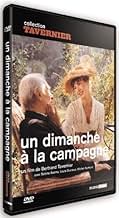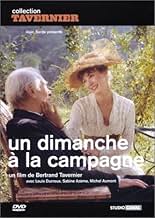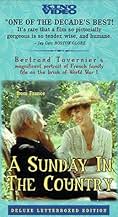AVALIAÇÃO DA IMDb
7,4/10
3,4 mil
SUA AVALIAÇÃO
Adicionar um enredo no seu idiomaAn elderly painter whose son visits with his family on the weekends, is also surprised by a visit from his still-single daughter.An elderly painter whose son visits with his family on the weekends, is also surprised by a visit from his still-single daughter.An elderly painter whose son visits with his family on the weekends, is also surprised by a visit from his still-single daughter.
- Direção
- Roteiristas
- Artistas
- Indicado para 1 prêmio BAFTA
- 13 vitórias e 12 indicações no total
Sabine Azéma
- Irène
- (as Sabine Azema)
Geneviève Mnich
- Marie-Thérèse
- (as Genevieve Mnich)
- Direção
- Roteiristas
- Elenco e equipe completos
- Produção, bilheteria e muito mais no IMDbPro
Avaliações em destaque
I think this film can be appreciated on several levels. For some viewers, this is just a happy family portrait, reflecting a more peaceful time and recalling one's own memories of family outings and quiet Sunday afternoons. I think this point of view is mistaken, but I can see why people feel this way. The film is externally slow- moving and peaceful, like a sunny river. But like a river, there are strong currents lurking, invisible, under the surface -- currents that cannot be seen, but only observed indirectly from their effects.
There's a lot more going on here than just ninety minutes of bucolic peacefulness. Pay attention to the details, the small looks and gestures, the things said and things left unsaid. You can almost see the fine strands that link the characters, like a spiderweb, where each character's movements are felt by all the others. The role of the narrator, often disparaged in film, is used effectively here, giving the film a somewhat novel-like quality and reminding the viewer of their presence as an observer.
There's more to be said about this film, but I don't feel quite up to it. In any case, the real meaning of the film can't easily be described in words -- which is a good thing, or the film would be unnecessary. So watch the film yourself, if you haven't already, and see what you think.
There's a lot more going on here than just ninety minutes of bucolic peacefulness. Pay attention to the details, the small looks and gestures, the things said and things left unsaid. You can almost see the fine strands that link the characters, like a spiderweb, where each character's movements are felt by all the others. The role of the narrator, often disparaged in film, is used effectively here, giving the film a somewhat novel-like quality and reminding the viewer of their presence as an observer.
There's more to be said about this film, but I don't feel quite up to it. In any case, the real meaning of the film can't easily be described in words -- which is a good thing, or the film would be unnecessary. So watch the film yourself, if you haven't already, and see what you think.
I saw this film as a gift. For images, reminding the work of an Auguste Renoir, for portrait of family and the small gestures defining the relations between its members, for lovely acting and for the good state of soul inspired by it.
I discovered it, in same measure, as a beautiful gift offered by Bertrand Tavernier. A precious gift about meaning of life and meanings of visits, about the games of children and problems of adults, about joy and the shadows of sadness, about a venerable manner and the lady helping him in ordinary problems.
Nostalgia ? Off course, but it represents more and , scene by scene, you feel it.
A beautiful film as a precious circle of emotions.
I discovered it, in same measure, as a beautiful gift offered by Bertrand Tavernier. A precious gift about meaning of life and meanings of visits, about the games of children and problems of adults, about joy and the shadows of sadness, about a venerable manner and the lady helping him in ordinary problems.
Nostalgia ? Off course, but it represents more and , scene by scene, you feel it.
A beautiful film as a precious circle of emotions.
In pre-WWI France Monsieur Ladmiral prepares for the day in his large country house near Paris. It is Sunday, the day his son Gonzague and family frequently visit him. Gonzague arrives by train with his wife and three children - two young sons and a daughter. Monsieur Ladmiral walks to the station to meet them. Well actually he only makes it about half way there when he meets the family walking toward his house. Thus we are introduced to one of the themes - how Ladmiral deals with getting older (in this case by denying that he can't walk as fast as he used to).
On this particular Sunday Ladmiral is also treated to a rare visit by his daughter Irène. She arrives by car and her breezy, outgoing personality dominates. The children take to her, but the reactions of the rest of the family are much more complex. Gonzague has been the dutiful son who has done what was expected of him while Irène is clearly a bit of a free spirit. But equally as clear is that Ladmiral favors his daughter for her determination to live life on her own terms and is disappointed that his son has not been more aggressive.
It is amazing how much we come to understand the dynamics of this family from observing them during this one day. Typical of the hints we get is Gonzague's comment, in response to the excitement over Irène's car, that "I had children and not a car." By the end you feel that you can extrapolate backward in time to the essential history of this family.
Particularly poignant are the musing of the old man himself. He has been a painter of some repute and respect, but feels perhaps that he took too modest a path in his work, that he could have been more experimental and made more significant contributions. Is he wishing that he had been more like Irène than Gonzague, and that is why he fancies his daughter?
The pacing is slow and the filming is lush. You are left with a certain wistfulness. This may evoke memories to visits to your own grandparents.
The focus in on the personalities and the undercurrents of conflicted feelings that exist in all families.
On this particular Sunday Ladmiral is also treated to a rare visit by his daughter Irène. She arrives by car and her breezy, outgoing personality dominates. The children take to her, but the reactions of the rest of the family are much more complex. Gonzague has been the dutiful son who has done what was expected of him while Irène is clearly a bit of a free spirit. But equally as clear is that Ladmiral favors his daughter for her determination to live life on her own terms and is disappointed that his son has not been more aggressive.
It is amazing how much we come to understand the dynamics of this family from observing them during this one day. Typical of the hints we get is Gonzague's comment, in response to the excitement over Irène's car, that "I had children and not a car." By the end you feel that you can extrapolate backward in time to the essential history of this family.
Particularly poignant are the musing of the old man himself. He has been a painter of some repute and respect, but feels perhaps that he took too modest a path in his work, that he could have been more experimental and made more significant contributions. Is he wishing that he had been more like Irène than Gonzague, and that is why he fancies his daughter?
The pacing is slow and the filming is lush. You are left with a certain wistfulness. This may evoke memories to visits to your own grandparents.
The focus in on the personalities and the undercurrents of conflicted feelings that exist in all families.
I saw this film many years ago and loved it and just rewatched it again, this time, on DVD with Bertrand Tavernier's commentary. I must say that I love it now even more. The two words that permeate throughout his film rhythm and time. It is strange to me that he does not say that impressionism was a major inspiration in the work, in fact he says the contrary. Yet I've noticed many films where the director meant to do something only it was taken very differently by the viewers and I guess this was such a case.
Anyway to get back to the film, in hearing Tavernier's commentary, I now realize how musical the whole film is, it's lazy, Sunday tone, then Irene (Azema) coming in like a tornado, then quiet conversations, then someone getting stuck in a tree, then another quiet conversation, then a dance...a series of stop starts that lulls you in its rhythm, but awakens you again with bursts of life and vitality.
In speaking of time and the passage of it, Tavernier encapsulates the life of Mr. Lamiral in one Sunday afternoon, and all the bittersweet sadness, through his relationship with his children, grandchildren, maid and himself through his actions and voiceovers made by an all knowing narrator.
I feel a sense of pride that Tavernier points out in his commentary the poignant scenes which I was so touched by in the first viewing. The scene where Irene tells herself that her niece would die young, the scene where Irene and her father speak of painting, The narrator supplying profound insights on M. Ladmiral about his indifference to his grandchildren. Gonzague's and his wife's decency, but utter clumsiness, living a life bounded by convention and security.
I also learned so much about camera movement through Tavernier. He describes not only the how, but why certain shots are shot they are and you begin to understand why certain scenes provoke certain emotions not only through dialogue and setting, but also how you hear something and see something. One scene where Gonzague and his wife are having an argument and M. Ladmiral comes into the scene but rather than say a word to interrupt, he concludes to himself that it is pointless and leaves the scene without uttering a word. Such a scene tells so much, the relationship of the couple, the father's relationship with the couple, and the father's relationship with himself, all in the frame of a 5 second shot. I'm grateful to M. Tavernier for having created such a beautiful film and added such brilliant insight on the nature of this work.
Anyway to get back to the film, in hearing Tavernier's commentary, I now realize how musical the whole film is, it's lazy, Sunday tone, then Irene (Azema) coming in like a tornado, then quiet conversations, then someone getting stuck in a tree, then another quiet conversation, then a dance...a series of stop starts that lulls you in its rhythm, but awakens you again with bursts of life and vitality.
In speaking of time and the passage of it, Tavernier encapsulates the life of Mr. Lamiral in one Sunday afternoon, and all the bittersweet sadness, through his relationship with his children, grandchildren, maid and himself through his actions and voiceovers made by an all knowing narrator.
I feel a sense of pride that Tavernier points out in his commentary the poignant scenes which I was so touched by in the first viewing. The scene where Irene tells herself that her niece would die young, the scene where Irene and her father speak of painting, The narrator supplying profound insights on M. Ladmiral about his indifference to his grandchildren. Gonzague's and his wife's decency, but utter clumsiness, living a life bounded by convention and security.
I also learned so much about camera movement through Tavernier. He describes not only the how, but why certain shots are shot they are and you begin to understand why certain scenes provoke certain emotions not only through dialogue and setting, but also how you hear something and see something. One scene where Gonzague and his wife are having an argument and M. Ladmiral comes into the scene but rather than say a word to interrupt, he concludes to himself that it is pointless and leaves the scene without uttering a word. Such a scene tells so much, the relationship of the couple, the father's relationship with the couple, and the father's relationship with himself, all in the frame of a 5 second shot. I'm grateful to M. Tavernier for having created such a beautiful film and added such brilliant insight on the nature of this work.
I saw this film sixteen years ago, at a time when I did not see many 'filmhouse' movies yet. It made a strong impression on me, I wasn't used to so many 'open spaces' in films, which spectators have to fill according to their own ideas. Later I understood that once you start filling these 'holes' with pieces of yourself, the film becomes much more personal.
From time to time I think back to this film, like I did just now when I looked it up in the IMDB. Its storytelling, or rather story-hinting, is apparently so strong that even after sixteen years I am looking for some answers to the questions that the film raises.
In short: go see it.
From time to time I think back to this film, like I did just now when I looked it up in the IMDB. Its storytelling, or rather story-hinting, is apparently so strong that even after sixteen years I am looking for some answers to the questions that the film raises.
In short: go see it.
Você sabia?
- CuriosidadesThe film is included on Roger Ebert's "Great Movies" list.
- Erros de gravaçãoIrene's flower in her bodice disappears and then reappears.
- Trilhas sonorasQuintette pour piano et cordes Op. 115
Written by Gabriel Fauré
Performed by Le quatuor Via Nova, Jean Hubeau piano solo
Principais escolhas
Faça login para avaliar e ver a lista de recomendações personalizadas
- How long is A Sunday in the Country?Fornecido pela Alexa
Detalhes
- Data de lançamento
- País de origem
- Idioma
- Também conhecido como
- A Sunday in the Country
- Locações de filme
- Château du Grand Saint-Léger, Villers-en Arthies, Val-d'Oise, França(house and garden)
- Empresas de produção
- Consulte mais créditos da empresa na IMDbPro
Bilheteria
- Faturamento bruto nos EUA e Canadá
- US$ 2.411.143
- Faturamento bruto mundial
- US$ 2.411.143
- Tempo de duração
- 1 h 30 min(90 min)
- Mixagem de som
- Proporção
- 1.66 : 1
Contribua para esta página
Sugerir uma alteração ou adicionar conteúdo ausente


























